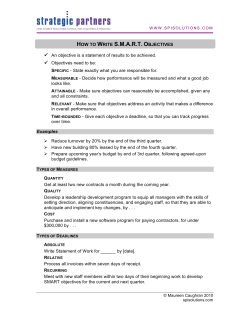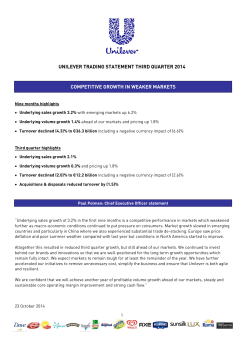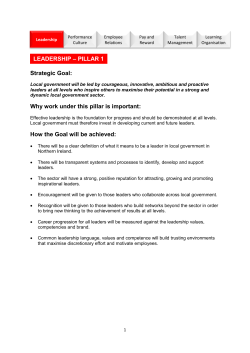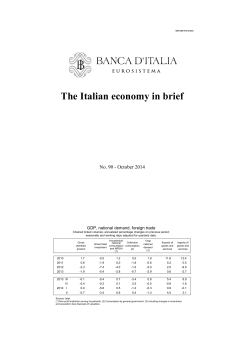
FM Insights into facilities management Facilities management market
ISSUE 12 • 2014 FM Insights into facilities management Facilities management market M&A update, Q3 2014 David Ascott Partner, Corporate Finance Grant Thornton UK LLP The recovery in M&A activity which saw deal numbers in the UK’s FM sector bounce back in the second quarter of 2014, following a protracted bear market for the sector, continued through the summer months. A total of 24 FM transactions were recorded during the period, the same number as was seen between April and June and the joint highest level witnessed since the second quarter of 2013. That said, the exceptionally quiet first quarter of 2014 means that the year-to-date figures represent the slowest nine-month period since we began monitoring the sector in 2007; even if the positive underlying factors that were discussed in the last quarterly bulletin (economic recovery, a strong IPO window, the return of PE bidders, etc) continue to hold firm, it is very unlikely that the fourth quarter will yield the sort of deal flow needed to match or exceed the previous three full-year figures. Nevertheless, despite returning anxiety in the Eurozone, the broader outlook over the medium term remains a positive one. • Headline trends for the quarter • Soft FM deals still in the majority • Share prices suffer following poor quarter for quoted FM businesses 1 Insights into FM - Issue 12 FM Headline trends for the quarter Once again, this latest quarter has also provided one stand-out transaction in size terms, in the shape of the acquisition by PE buyers TDR Capital and Sun Capital Partners of Lloyds Banking Group’s stake in Keepmoat. The deal, which valued the Doncaster-based housing regeneration and building services holding company at a reported £400 million (believed to be a little under 7x EBITDA), boosted the value of disclosed deals to its highest level in around two years. It follows a succession of other significant transactions in preceding quarters, such as the acquisitions of VPS from TDR Capital, Initial Facilities (‘IFS’) from Rentokil Initial in the first half of 2014, and Norland Managed Services by CBRE Group in the final quarter of 2013. Aside from its size, the Keepmoat deal is also significant in that it again highlights the renewed interest in the FM sector among the private equity community. Although PE buyers only announced two such deals during the third quarter, they have almost reached double figures for the nine months to date, the highest level since 2011 and already more than 2013’s full-year figure. What’s more, PE houses have also been active as vendors as well as buyers: TDR Capital has played both roles recently, with the Keepmoat and VPS deals, while Bridgepoint Development capital more than doubled its money on the sale of the UK energy management services provider Energy Solutions Group to SSE plc during the second quarter. As the overall market conditions continue to improve and leverage becomes more freely available and flexible, it is more than likely that PE buyers will continue to make their mark on the sector. International buyers, which generated an important part of the FM sector deal flow in the latter part of 2012 and throughout 2013, also returned in the third quarter of this year after a quiet first half. Spie and Ameresco, which acquired Scotshield Ltd and Energyexcel LLP’s energy consultancy and energy project management business respectively, have both been active buyers in the UK FM sector over the last couple of years. They were joined by Epta SpA of Italy and Noonan Services Group of Ireland in Q3. Soft FM deals still in the majority In terms of the split in M&A activity between soft and hard FM sub-sectors, the trend which has seen more deal flow among soft FM businesses over the last two years continues. In particular, there has been a spike in activity in the cleaning sub-sector and signs are that this may well continue as further consolidation takes place; Maxim Facilities Management Ltd acquired two cleaning businesses (Ross Cleaning Services and New Life Cleaning Systems’ contract cleaning division) during the third quarter and has announced that it is planning more deals in the sector. The security and other soft FM sub-sectors also chipped in with eight deals between them in the latest period, continuing their strong run. 2 Insights into FM - Issue 12 Among the hard FM sub-sectors, the utilities area also continues to produce a steady flow of interesting transactions, including the Q3 acquisitions of Forefront Group Ltd by Renew and Energy Solutions Group by SSE plc. What’s more the sector may benefit from the much-needed £100 million boost to the Green Deal announced by the energy secretary Ed Davey at the beginning of the fourth quarter. The new money will be used to reinstate the ‘Home Improvement Fund’ cash-back incentive scheme which had been fully spent by July of this year. FM Quoted FM Tracker Share prices suffer following poor quarter for quoted FM businesses “Whilst some of the larger listed FM players have continued to attract unfavourable headlines and have suffered sliding share prices it is encouraging to see an uptick in private equity investment in the sector as highlighted by the Keepmoat transaction. This could indicate how opportunities are emerging for the larger private companies in the sector as the corporate landscape changes and less dominated by the traditional listed players” David Ascott Partner, Corporate Finance 3 Insights into FM - Issue 12 The contraction in share prices among our quoted FM peer group in the second quarter, which had brought a prolonged bull run to an end, crystallised further in the third quarter. Only four of the group recorded a positive movement in their share price over the quarter, with Rentokil’s increase of 5.75% being the most notable. The remaining 10 businesses on the list saw a fall in their share prices over the period, leaving the average for the peer group down by a shade over 5%. This compares with a fall in both the FTSE All Share and FTSE Support Services indices of 1.8% in the same three-month window. Over the sixmonth period the decline is even more pronounced, with the FM businesses seeing a decline in share prices of 8.5%, versus falls of 0.6% (FTSE All-share) and 6.7% (FTSE Support Services). The only positive comparison for the FM peer group is in the longer term analysis: over the last two years the valuation of the listed FM businesses on the tracker has grown by almost 34% - some way ahead of the other two main indices. However, despite the weak comparisons over the latest two quarters, it is worth highlighting that the statistics are somewhat at odds with the general mood across the sector, and for a number of important FM businesses the most recent company results have actually been relatively positive. For instance, Compass, which saw a decline of almost 8% in its share price over Q3, recently reported a relatively healthy growth in organic revenues of around 4%, though this news came towards the back end of the quarter. Likewise, G4S, which has endured a difficult trading period over the last couple of years, has also been able to issue some good news of late, with positive interims in August and the successful sale of a Swedish subsidiary the month before; yet it too saw its share price fall, albeit by a much smaller margin (1.76%). Finally, Rentokil has seen fluctuations in its share price (and is up over the last quarter), but its latest set of interims suggest that its operations continue to perform well. Overall, much of the damage to the peer group’s average price has clearly come from the two top-five companies that have seen the biggest declines: Serco’s stock has suffered the most, with a 21.7% fall in the last quarter and a 50%+ slide over the last couple of years, amidst sliding revenues and margins. Meanwhile Balfour Beatty has also seen its stock fall by almost 20% over the last quarter and over 37% over the last two years. The business recently reported an additional £75 million profit shortfall in its construction business and has announced that KPMG will conduct a detailed review on cost controls. FM Pressures on cash flow and working capital continue With competition in the FM sector increasingly intense and with continued pressure on margins, the emphasis on driving cash flow and optimising working capital has never been greater. Cash flow is the lifeblood of any organisation but in the FM sector especially, it can be the difference between having a funding structure that supports growth and one that restricts it. However, the challenges in optimising cash flow in the FM sector are many and varied. From the initial contract tender and negotiations, through to the establishment of efficient processes and tight internal controls that support timely billing and cash collection, there are multiple levers which can, if not appropriately managed, drive excessive working capital requirements. So how well are FM companies responding to the challenge? Benchmarking net working capital levels (as a percentage of a company’s turnover) for 85 of the UK’s top FM companies is indicative of the difficulties 4 Insights into FM - Issue 12 faced in optimising working capital in the FM sector. Over the last four years, average working capital levels for this group have increased by 0.9 percentage points. For the companies in our sample, this equates to a staggering £654 million of additional working capital required to fund operations. Clearly there are winners and losers and a company’s size along with the number and nature of FM services provided will influence what ‘good’ looks like. Regardless of these factors, however, there is still plenty of ‘selfhelp’ available, with those companies who treat working capital as an organisational responsibility, rather than simply a finance problem, being the ones at the forefront of best practice. FM Some of the practices we are working with leading FM companies to implement are as follows: • Robust Bid Stage Cash Flow Forecasting during the contract tender process with clear and well understood business rules driving the negotiation of commercial terms with both customers and sub-contractors • Elimination of ‘Cash Leakage’ through enhanced focus and control over the capture of timesheets, subcontractor invoices and other backing documentation required to support full and timely bill issuance • Investing time and effort during contract set-up to build Understanding of Client Accounts Payable Processes, especially where there are specific requirements for Purchase Orders or invoice pre-approvals to be obtained before invoicing takes place • Developing Contract-Level Operational Metrics to support account managers in making more effective decisions and taking timely actions around working capital, with appropriate alignment of incentives and bonuses for strong performance Mark O’Sullivan Partner, Working Capital Advisory T 020 7728 3014 E mark.osullivan@uk.gt.com 5 Insights into FM - Issue 12 • Building trust and confidence with suppliers and sub-contractors through Transparent and Consistent Payment Policies that are adhered to, moving away from an approach of making tactical payment holds around reporting period ends • Clear Organisational Roles and Accountability for Credit Control including segmented customer collection strategies, escalation paths and processes for timely and effective issue/dispute resolution What is clear is that adopting a proactive approach to managing commercial agreements, driving consistent processes based around an understanding of best practice and tightening controls can have a transformational impact on cash flow. Mark O’Sullivan, an Advisory partner at Grant Thornton, has spent the last seven years specialising in the area of working capital management. He has worked extensively across the FM space supporting companies, ranging from owner-managed to FTSE100, in identifying and delivering transformational and sustainable improvements in working capital performance, often in the range of 5 - 10% of annual turnover. FM Contacts For any further information, please contact: David Ascott T 020 7728 2315 E david.p.ascott@uk.gt.com Pete Dawson T 020 7728 3197 E peter.dawson@uk.gt.com Martin Gardner T 020 7728 2847 E martin.n.gardner@uk.gt.com Usman Malik T 020 7728 2321 E usman.b.malik@uk.gt.com Grant Thornton Facilities Management – subsector map Hard FM Soft FM Fabric maintenance Security Fit-out Cleaning Mechanical & Engineering Catering Fire Protection Washroom hygiene Grounds Maintenance Textile/Laundry Utility Maintenance Pest Control Reprographics Space planning Relocation and Storage © 2014 Grant Thornton UK LLP. All rights reserved. ‘Grant Thornton’ refers to the brand under which the Grant Thornton member firms provide assurance, tax and advisory services to their clients and/or refers to one or more member firms, as the context requires. Grant Thornton UK LLP is a member firm of Grant Thornton International Ltd (GTIL). GTIL and the member firms are not a worldwide partnership. GTIL and each member firm is a separate legal entity. Services are delivered by the member firms. GTIL does not provide services to clients. GTIL and its member firms are not agents of, and do not obligate, one another and are not liable for one another’s acts or omissions. This publication has been prepared only as a guide. No responsibility can be accepted by us for loss occasioned to any person acting or refraining from acting as a result of any material in this publication. grant.thornton.co.uk V24629
© Copyright 2025









